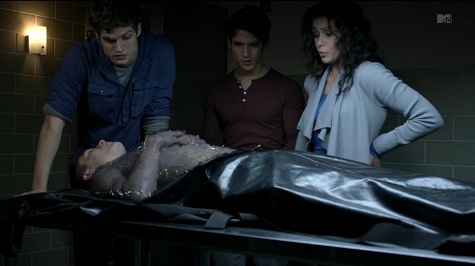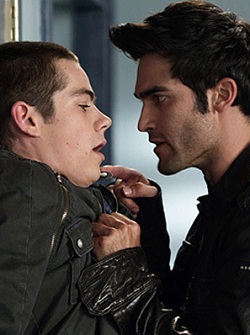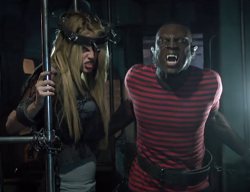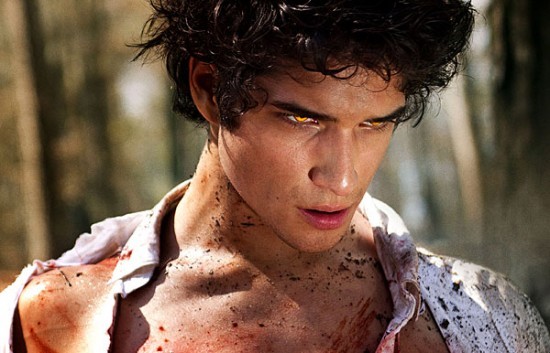You aren’t watching this show. Know how I know you’re not watching this show? Because you, like me, heard that MTV—bastion of lowest common denominator reality TV, teenagers making very poor life choices, and Carson Daly—was remaking a cheeseball 80s movie about a high school basketball player cum werewolf. No amount of world-weary sighing or Internet hand-wringing about the deplorable state of the contemporary television landscape could adequately cover the depths of your irritation at the very mention of its existence. “It has to be the stupidest thing anyone’s ever put on the small screen,” you bemoaned loudly. And you were wrong. We both were. Oh, so very wrong.
Last year I finally joined Tumblr. Looking back, that was one of those moments that seemed insignificant at the time, but later you realize it was a major turning point in your personal evolution. Tumblr introduced me to Destiel, which lead me to Supernatural, and my life collapsed around me—just as it did a few years back when a friend sent me a clip of Spike and some hot dude in a coat making out during a bar fight and I died of heart failure and was reborn a SFF fanatic. Likewise, I was considering giving Teen Wolf a try after nearly drowning in a deluge of Stiles GIFs and Sterek slash, but it was after meeting a Tumblr blogger IRL at an Amanda Palmer concert—we bonded over our mutual Doctor Who tattoos and my “Smoke on the Water” ringtone—who gave me the final push.
Teen Wolf isn’t a great show, but it is an awesome one. It is everything True Blood has failed to be. It’s genetically closer to Angel (minus the Monster of the Week format) than its namesake or home network. Yes, it can be very, very stupid sometimes—I literally cringe whenever the weres runs on all fours—but then out of the blue they toss out a gorgeously composed shot, structurally complex scene, or dizzyingly quippy dialogue. As much as I love to whine about how MTV no longer plays music, Teen Wolf has a killer soundtrack. And the opening credits, great Hera’s ghost, but it’s one of my favorites on TV. Jeff Davis, creator of Criminal Minds (another show I enjoy probably more than is healthy), knows how to ratchet up the suspense and frights, and he complements them well with humor and relatable characters.

Davis doesn’t shy away from violence or gore, either, but uses it sparingly—which heightens the impact tremendously. Take a scene from the fourth episode of season 3. In it, Derek and a beta get into a brawl with a couple alphas. You think you know where this is going, that Derek and Cora will get their asses kicked or get saved last minute by Scott, but instead one of the alphas rams a pipe through Derek’s chest and pins him to the ground so Deucalion can cut the cheese with him. The show is great at setting up expectations then countering them unexpectedly, intensely, graphically, and bloodily.
There’s something kinda amazing about a television show that balances perfectly its Rocky Horror-esque camp with the kind of seriousness rarely seen outside a teen drama while not crumbling into ridiculousness like many lesser shows of its ilk (hi there, Secret Circle and Beauty and the Beast). But it wasn’t always so entertaining. The first season can be a struggle to get through, depending on your level of tolerance for over-the-top angst and lacrosse. But it also has the “Derek/Miguel” scene, which ranks somewhere between “If there’s a key, then there must also be a lock!” and David Duchovny on Twin Peaks as one of my favorite television scenes ever filmed.
The second season shakes things up a lot and minimizes the Romeo and Juliet theme in lieu of world building and B- and C-season-long arcs with a much higher stakes. Rather than relying on over-used mythological creatures, the show creates a whole new supernatural being, the Kanima, and things go crazy town banana pants from there. Season 3 improves on its predecessors, and promises a magical serial killer, a psychotic alpha pack, and a tense alliance between the hunters and the weres.
 The acting talents vary from keeps-getting-better to would-probably-be-adequate-in-a-minor-role-on-a-CBS-cop-show, but it’s Tyler Posey and Dylan O’Brien that really stand out. Dylan’s a good actor bordering on very, and though most of the time Tyler stretches the limits of his fairly minor acting abilities, every so often he knocks it out the park. Both have completely mastered their roles. They know the ins and out of their characters, and play them to the fullest. One of the best things about 8 seasons of Supernatural is watching Jensen Ackles and Jared Padalecki grow into and with their characters, developing personal ticks and idiosyncrasies, interests and hobbies. Tyler and Dylan have sussed out their characters’ every quirk in 2 seasons flat while also shedding light on what sort of people Scott and Stiles might be when they grow up.
The acting talents vary from keeps-getting-better to would-probably-be-adequate-in-a-minor-role-on-a-CBS-cop-show, but it’s Tyler Posey and Dylan O’Brien that really stand out. Dylan’s a good actor bordering on very, and though most of the time Tyler stretches the limits of his fairly minor acting abilities, every so often he knocks it out the park. Both have completely mastered their roles. They know the ins and out of their characters, and play them to the fullest. One of the best things about 8 seasons of Supernatural is watching Jensen Ackles and Jared Padalecki grow into and with their characters, developing personal ticks and idiosyncrasies, interests and hobbies. Tyler and Dylan have sussed out their characters’ every quirk in 2 seasons flat while also shedding light on what sort of people Scott and Stiles might be when they grow up.
No one’s quite figured out what to do with Allison Argent, most of all Crystal Reed. Holland Roden’s Lydia Martin is the SASS MASTER, and one day the writers will give her a real storyline more substantial than resident scream queen. Tyler Hoechlin still hasn’t learned that Derek Hale’s personality should go beyond nice abs and an ever-present growl. Daniel Sharman plays Isaac as the world’s most adorably put upon boy king of eye rolling, and all I want to do is take him home, bake him a pie, and mother him forever and ever. Everyone else is varying degrees of attractive but underdeveloped.
To compare the show to another Joss Whedon creation, Scott and Stiles remind me a lot of Buffy and Willow/Xander from the high school seasons of Buffy the Vampire Slayer (with Lydia guesting as Cordy). Neither boy is particularly bright, but they’re earnest and have a clear sense of right, wrong, and—importantly—when to accept that doing the right thing doesn’t always mean doing what’s good. They aren’t caught up in werewolf politics and hierarchies; they just want to live their lives and protect their friends and families. When these kids run into trouble, they do what any Scoobie worth their salt would do: research. They plan, and re-plan, and plan some more. Scott may not look like much, but he can strategize the hell out of a long game. The whole back half of season 2 turned out to be Scott being a manipulative little smart ass who outwitted three Big Bads without breaking a sweat. Stiles is running the game in season 3, having untangled one of two possibly connected Big Bads all on his own.
 The best thing about Teen Wolf is its shocking level of diversity. One of the characters is a gay Hawaiian. In season 3, a girl is attacked not because she’s a lesbian with a girlfriend, but simply because she was in the wrong place at the wrong time. No one makes a big deal out of someone being gay for the same reason no one cares if someone’s straight. The way Teen Wolf is written, you could literally swap the race, sex, gender, or orientation and it wouldn’t alter the character in any substantial way. Not because the writers have white-washed everyone, but because those aspects don’t influence the characters’ relationships with each other.
The best thing about Teen Wolf is its shocking level of diversity. One of the characters is a gay Hawaiian. In season 3, a girl is attacked not because she’s a lesbian with a girlfriend, but simply because she was in the wrong place at the wrong time. No one makes a big deal out of someone being gay for the same reason no one cares if someone’s straight. The way Teen Wolf is written, you could literally swap the race, sex, gender, or orientation and it wouldn’t alter the character in any substantial way. Not because the writers have white-washed everyone, but because those aspects don’t influence the characters’ relationships with each other.
They don’t care if you’re black or bi or nerdy or sexually active or whatever. It’s the person that matters, not the presentation or societal labels. There’s this great Kerry Washington quote from a 2010 Essence Magazine article where she says, “I just want to get to the point where my racial identity is simply a part of what makes me unique in the way being from the Bronx makes me unique, or being an Aquarius, or being born in 1977 and having hip-hop be a part of my heartbeat.” That is exactly what Teen Wolf does.
Everyone is accepted or rejected based solely on their personality, not what race, color, creed, sex, gender, or orientation they are or aren’t. And there’s not even a discussion about it. Their world is diverse and no one thinks twice about it. Teen Wolf refuses tokenism in favor of diversity. Think about that for a moment. How many Native Americans/Alaskan Natives/Pacific Islanders are active in film or television right now? How many gay characters aren’t stuck playing the best friend or a horrendous stereotype? How many plus-sized characters—or plus-sized people of color—aren’t relegated “fatty go boom” jokes? How many shows and movies about teenagers don’t reduce them to blood-thirsty bullies and mean girls? Teen Wolf emotionally reflects what it’s like to be a teenager—star-crossed romance, best friends, academic struggles, hormones, etc.—while not (fully) succumbing to clichés and petty melodrama.
And you thought this was just a dumb show about hormonal teenagers.
Alex Brown is an archivist, research librarian, writer, geeknerdloserweirdo, and all-around pop culture obsessive who watches entirely too much TV. Keep up with her every move on Twitter, or get lost in the rabbit warren of ships and fandoms on her Tumblr.










